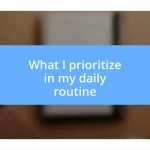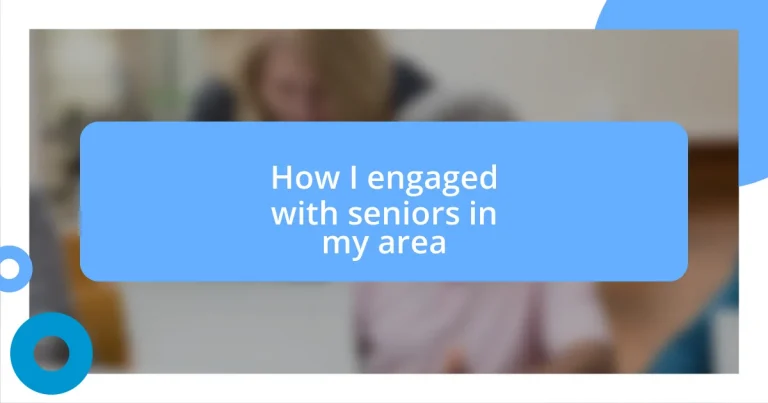Key takeaways:
- Social interactions are vital for seniors’ emotional well-being, highlighting the importance of meaningful connections.
- Engaging with local senior groups through exploration, online research, and community organizations reveals hidden opportunities for support and camaraderie.
- Facilitating activities and storytelling sessions fosters deeper relationships and enhances seniors’ joy, confidence, and social engagement.
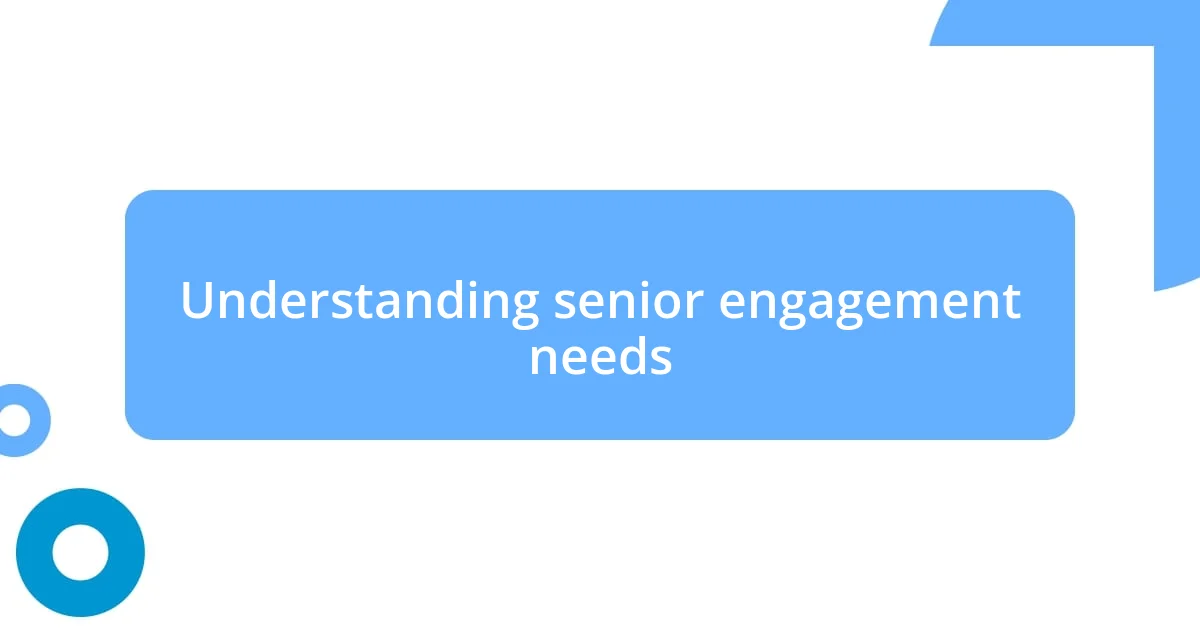
Understanding senior engagement needs
Understanding the engagement needs of seniors requires a nuanced approach. I remember chatting with a lovely lady named Ruth, who shared her feelings of isolation after losing her husband. It struck me how important social interactions are for emotional well-being. How often do we overlook the simple joy a friendly conversation can bring to someone who is feeling lonely?
Seniors often seek meaningful connections, and it’s fascinating to see how varied those needs can be. Some thrive in group activities, while others prefer one-on-one interactions. I once organized a small book club for seniors, and the excitement I saw when they connected over shared stories was priceless. Could it be that these small gatherings fulfill a deeper need for companionship and understanding?
It’s essential to recognize that engagement is not just about activities; it’s about fostering a sense of belonging. I once asked a group of seniors what they valued most in their daily interactions, and the answers ranged from kindness to shared interests. Their insights reminded me that when we understand what drives their desire for connection, we can create environments where they truly feel valued and engaged.
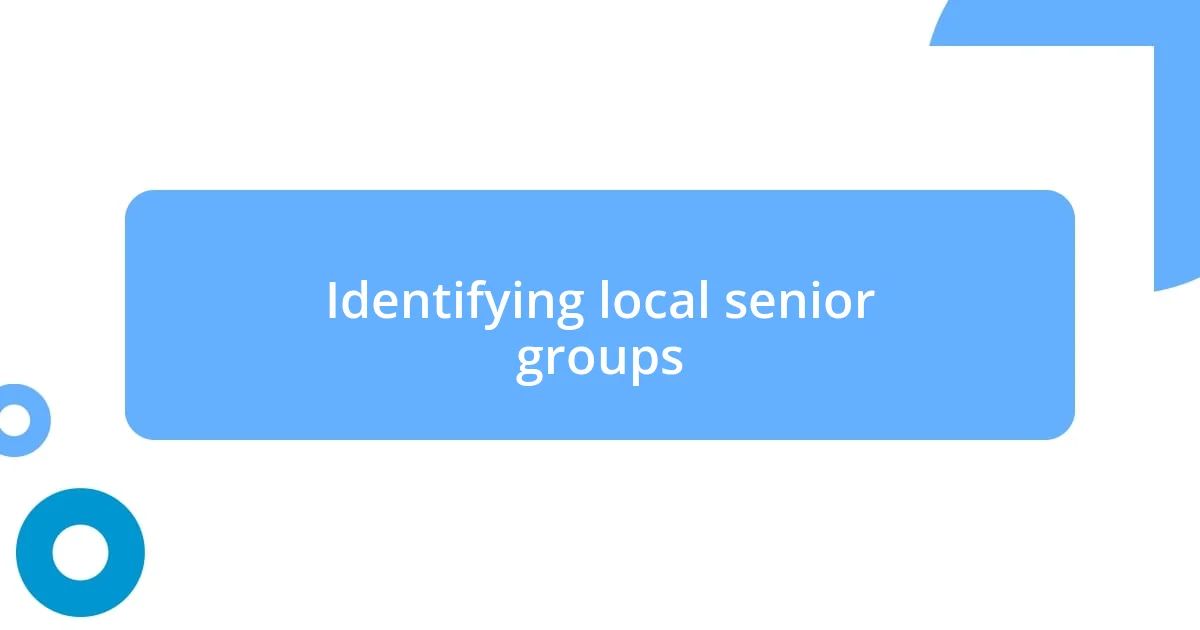
Identifying local senior groups
Identifying local senior groups begins with a bit of research and active exploration in your community. I remember taking a casual stroll in my neighborhood park, where I noticed seniors often gathering for exercise classes and social chats. It made me realize these informal meetups were a treasure trove of connections just waiting to be explored. Sometimes the most impactful groups are those that aren’t widely advertised, existing in the very fabric of our daily lives.
A quick search online also opened up avenues I hadn’t previously considered. Local libraries often host book clubs and workshops specifically tailored for seniors, and community centers run regular events aimed at this demographic. I attended a free lecture at a local community center and was struck by the warm camaraderie among the attendees. The joy they radiated reminded me that finding these groups is like uncovering hidden gems; they enrich our lives and offer a vibrant space for sharing experiences.
Reaching out to local organizations such as churches or senior advocacy groups can also guide you in identifying available resources. I remember connecting with a local senior services organization, which not only provided a list of groups but also facilitated introductions. The process was enlightening, showcasing the variety of interests and talents among seniors. It became clear to me that identifying these groups isn’t just about finding a list; it’s about understanding the underlying community of support and friendship that they offer.
| Method | Insights |
|---|---|
| Casual Exploration | Personal connections are often overlooked, found in everyday settings like parks. |
| Online Research | Libraries and community centers offer structured groups that provide social opportunities. |
| Local Organizations | Engaging with senior services can unveil networking and support systems. |
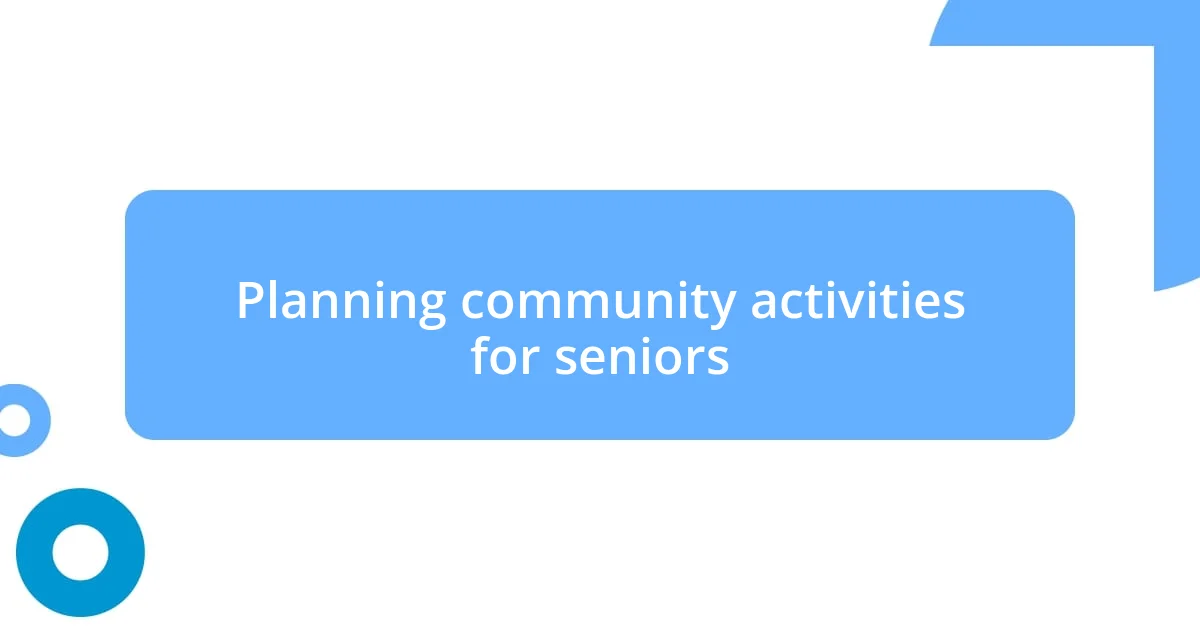
Planning community activities for seniors
When planning community activities for seniors, I find it’s crucial to start with their preferences. I once joined a planning meeting where local seniors shared their ideas for events. They emphasized a mix of fun and familiarity, like game nights and cooking classes, which made the planning process not only collaborative but also a joy. It was enlightening to see their enthusiasm as they envisioned new experiences that catered to their interests.
Here are some engaging activity ideas that resonated well with seniors:
- Social Game Nights: These foster camaraderie and healthy competition.
- Art and Craft Workshops: Engaging creativity can spark joy and relive treasured memories.
- Nature Walks or Gardening: Getting outside while nurturing plants provides fresh air and physical activity.
- Themed Movie Nights: Watching classics often brings back fond memories and inspires conversations.
- Local History Tours: Seniors appreciate connecting with their roots and sharing their stories.
Every time I help organize an event, I’m reminded that creating space for these activities allows seniors to form connections, share laughter, and often rediscover a sense of joy in their lives. These insights have deepened my understanding of what truly enhances their community experience.
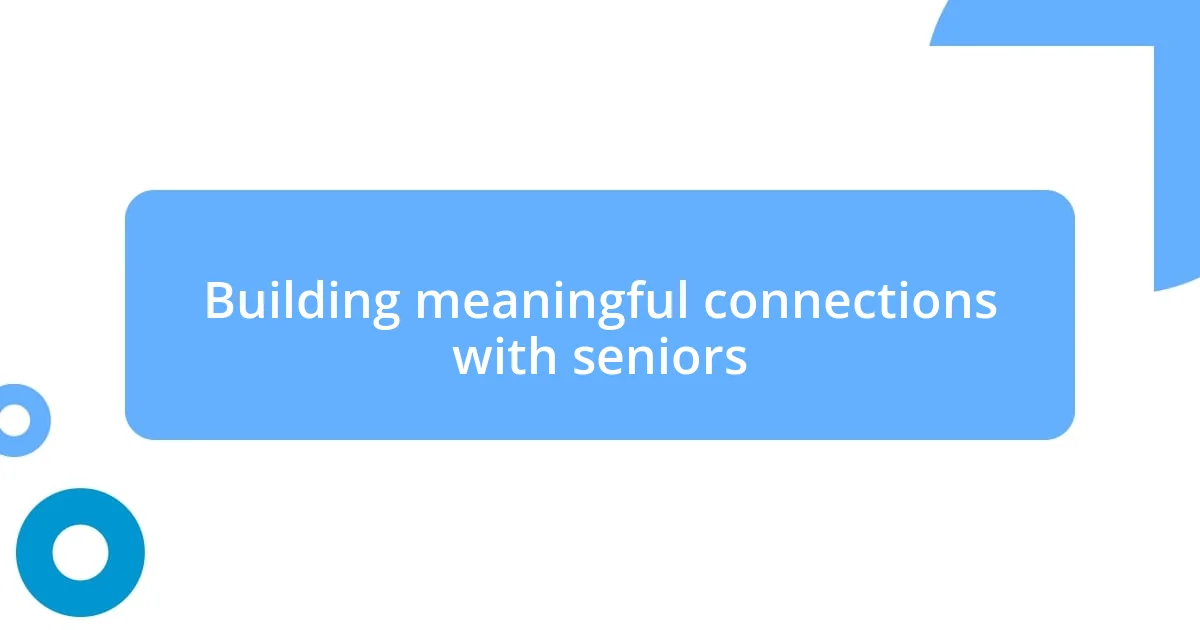
Building meaningful connections with seniors
Building meaningful connections with seniors often starts with simple conversations. I recall sitting in a cozy café, where I struck up a chat with an elderly gentleman over coffee. He shared stories that spanned decades, filling the air with laughter and nostalgia. It was a reminder of how powerful it is to just listen—every story shared is a bridge built, fostering understanding and companionship.
As I engaged more with my senior neighbors, I realized that common interests were key to building deeper relationships. For instance, forming a walking club with seniors in my area not only promoted health but also created a platform for sharing experiences. It was heartwarming to see how these shared moments turned into lasting friendships, igniting a sense of community that felt vibrant and alive. Have you ever noticed how a shared activity can spark an unexpected connection?
The impact of kindness in these interactions also cannot be overstated. I remember one afternoon volunteering at a local senior center, and an elderly woman thanked me with tears in her eyes for simply spending time with her. It hit me—those tiny gestures of connection could mean the world to someone who might feel isolated. It made me reflect on how our presence, even in small ways, can light up someone else’s day, and that, in my experience, is what makes every interaction meaningful.
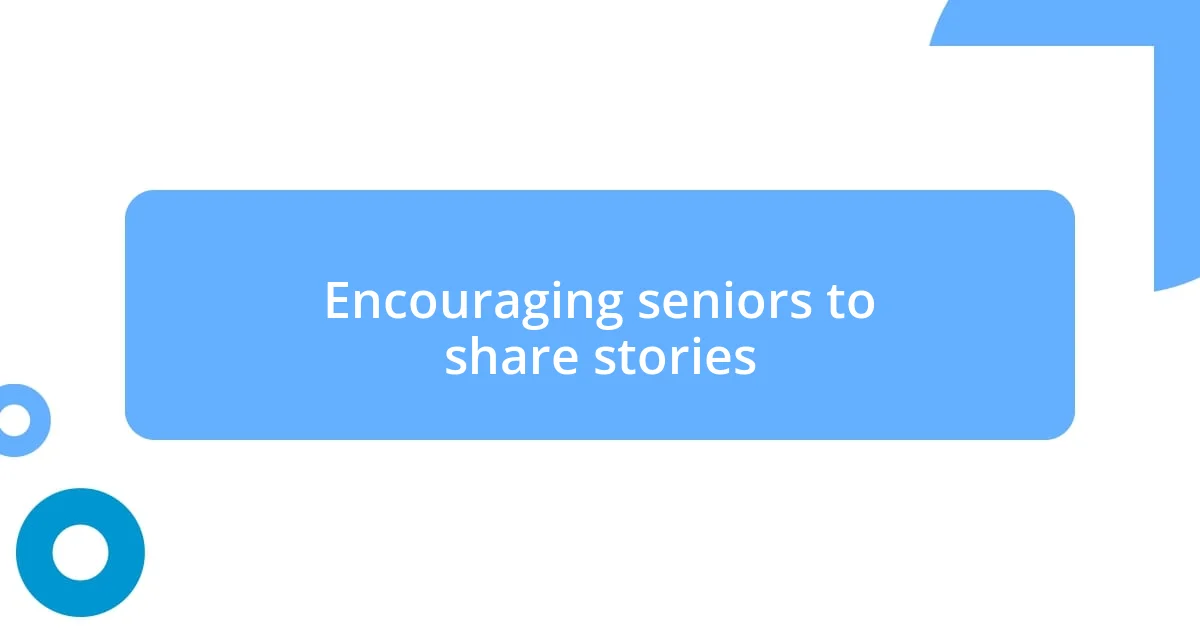
Encouraging seniors to share stories
Encouraging seniors to share their stories can be a deeply rewarding experience. I once hosted a storytelling session at a local community center, and I was amazed by the flood of memories that surfaced. Each tale was like a precious gem, revealing not just individual experiences but also the rich tapestry of our shared history. How often do we pause to hear the wisdom that comes with age?
In my experience, creating a comfortable environment is vital for encouraging seniors to open up. During those sessions, I would often use a simple prompt, like “What was your favorite childhood memory?” Instantly, faces lit up, and laughter erupted as they reminisced about simpler times. I felt a sense of warmth as their personal stories unfolded, reminding me how valuable it is to create spaces where they feel safe and valued. What if we all took a moment to listen to those stories?
I’ve also learned that storytelling can lead to meaningful connections among seniors themselves. While facilitating a group, I noticed two participants bonding over their shared love of classic movies. As they exchanged anecdotes about cinema, it was like watching a new friendship blossom. It made me realize there’s immense power in storytelling—not just for the one sharing but also for the listeners. Isn’t it incredible how stories can weave us together in unexpected ways?
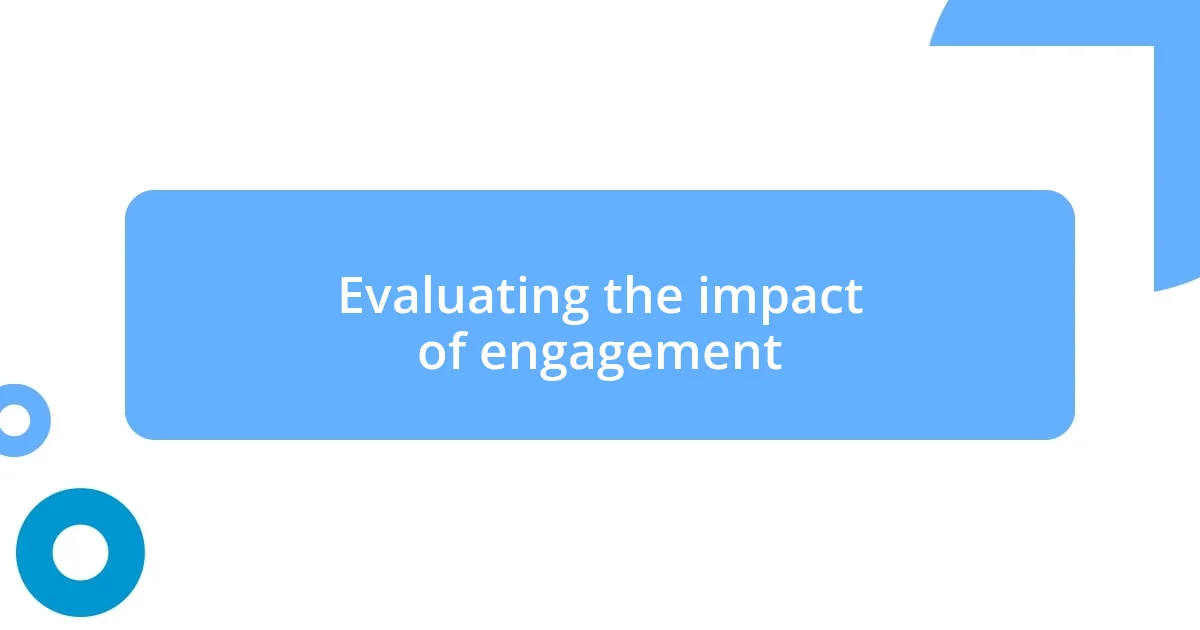
Evaluating the impact of engagement
Evaluating the impact of engagement with seniors isn’t just about numbers; it’s about the feelings and connections that emerge. I remember after establishing a regular game night, one of the participants, a widowed veteran, opened up about his late wife while playing chess. It was one of those moments when I realized our gatherings had become a safe harbor for sharing emotions and memories—something incredibly enriching for both him and me. Could there be a greater impact than seeing someone rediscover joy through friendship?
Social engagement also fosters emotional and mental health improvements among seniors. I witnessed this firsthand during a monthly book club, where seniors eagerly shared not just their thoughts on literature but also their personal experiences related to the stories. Their laughter and animated discussions turned what could have been a solitary activity into a lively exchange of perspectives, reminding me of the invigorating power of communal connection. Isn’t it fascinating how an engaging conversation can transform a person’s day?
Lastly, measuring our impact requires us to observe the subtle changes in the seniors’ attitudes and behaviors. For instance, after a few months of interaction with my senior neighbor, I noticed his once-timid demeanor evolve into confidence and eagerness to participate in community events. His transformation reinforced my belief that meaningful engagement not only combats loneliness but also empowers individuals. How can we not feel inspired by those shifts, which highlight the profound purpose of our connections?

